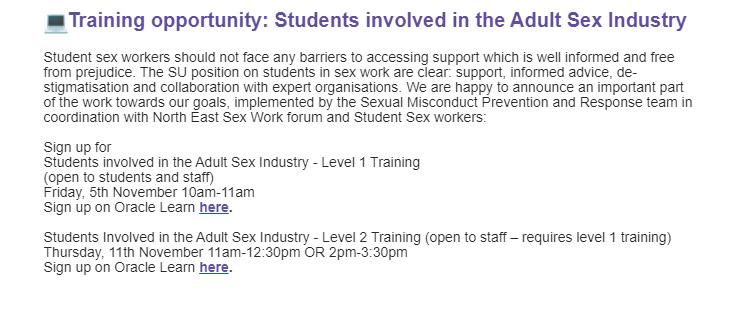Durham University has come under criticism for its decision to offer students an online course on working in the sex industry. The ‘opportunity’ is designed to offer students “support which is well informed and free from prejudice” so that they can be “safe and make informed choices.” For example, Level 1 involved discussions on “the laws that govern sex work”, “the challenges students can face”, “motivations for entry for students” and the “impact of Covid” on the industry.
There has, unsurprisingly, been a backlash. MP Diane Abbott called the move “horrific”; Further Education Minister Michelle Donelan warned that the university is “legitimising a dangerous industry” and Only Fans model Kaya Corbridge said that Durham is “preying on people’s vulnerability.”

On the one hand, some of the moral panic seems unnecessary; it is hardly a recruitment or marketing exercise. Most headlines have used the word ‘training’, which is somewhat misleading — the course is designed for students already involved in sex work, and it is unlikely to ‘encourage’ other students to consider the profession. There are many reasons why students may choose to sell sexual services — high cost of living, low wages associated with other professions, lack of financial assistance or grants — and ultimately students will be swayed by financial factors above all else.
The problem is that the debate has become about whether or not sex work should be promoted or condoned, and not about how best to protect sex workers from physical and mental harm. Durham’s student union may argue that knowledge is power, but making something ‘more safe’ does not mean it is actually safe; sex work is inherently dangerous, and it is disingenuous to pretend otherwise.
Even more ‘sanitised’ forms of sex work such as selling images or videos online carry risk — for example, psychological distress, blackmail, or ruined future employment prospects — and highlighting these threats isn’t enough. It doesn’t matter how many potential risks are flagged; if it’s a question of prostitution or poverty, then how can students ever make ‘safe and informed choices’ when consent is no longer clear-cut?
Support for sex workers needs to be proactive as well as reactive. For example, one of the aims of the course is to inform student sex workers on how to report violence, exploitation and blackmail; however, at this point, the damage is already done. The only way to genuinely protect students from these dangers is either to give them the necessary support to leave the industry or stop them from joining altogether. What we must not do is pretend that with a simple ‘toolkit’ students can continue sex work consequence-free as if they were taking part in any other form of labour.
Earlier this year the Office for Students gave an additional £50million worth of funding to universities to address student hardship. However, there are other options that would also help: for example, re-establishing Maintenance Grants for the most disadvantaged students; ensuring that student work placements are always paid; or introducing rent caps for student accommodation. Alternatively, Durham could use some of its £86million endowment to directly help its student sex workers who it has now seemingly identified.
There is no doubt that student sex workers deserve to be supported and protected, and we cannot do so by pretending they do not exist. Yet the reality is that the vast majority of students enter this inherently exploitative industry out of economic hardship, and so if Durham wants to provide genuine pastoral care for them, then it should put its money where its mouth is.











Join the discussion
Join like minded readers that support our journalism by becoming a paid subscriber
To join the discussion in the comments, become a paid subscriber.
Join like minded readers that support our journalism, read unlimited articles and enjoy other subscriber-only benefits.
Subscribe